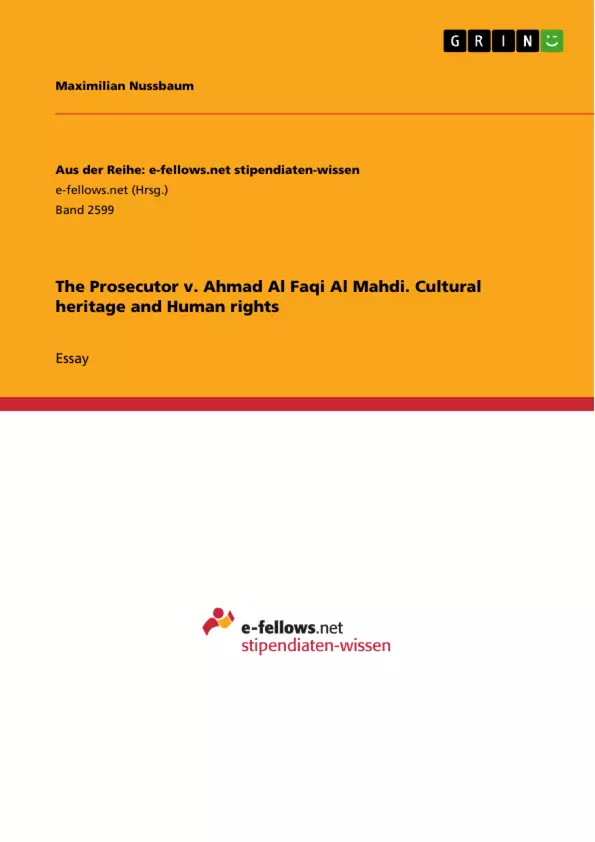In the decision of the ICC in September of 2016, Ahmad Al Faqi Al Mahdi was found guilty of the war crime of "intentionally directing attacks against historic monuments and buildings dedicated to religion" in Timbuktu, Mali in June and July of 2012 and sentenced to nine years. It was the first time a perpetrator was sentenced for the destruction of heritage dedicated to religion as the main charge. I will have an in-depth look at the case and the judgement of the ICC (II.), then provide brief background information on the role of cultural heritage in human rights through a sample of resolutions, conventions, statutes, and decisions (III.), to ultimately comment on the Al Mahdi decision (IV.).
Inhaltsverzeichnis (Table of Contents)
- Introduction
- The decision
- Facts and circumstances of the case
- Findings and gravity of the crime
- Cultural heritage and human rights
- Comment on the decision
- Interpretation of Article 8 (2)(e)(iv)
- Universal rationale regarding gravity of crime
- Conclusion and prospect
Zielsetzung und Themenschwerpunkte (Objectives and Key Themes)
This paper analyzes the ICC's decision in the case of Ahmad Al Faqi Al Mahdi, who was convicted of the war crime of destroying cultural heritage in Timbuktu, Mali. The analysis focuses on the interpretation of Article 8 (2)(e)(iv) of the Rome Statute, the rationale behind the gravity of the crime, and the broader implications of this decision for the protection of cultural heritage in international law.
- The ICC's first conviction for the destruction of heritage dedicated to religion
- Interpretation of Article 8 (2)(e)(iv) of the Rome Statute
- The role of cultural heritage in human rights
- The gravity of the crime against cultural heritage
- The importance of protecting cultural property in modern warfare
Zusammenfassung der Kapitel (Chapter Summaries)
- Introduction: This section introduces the case of Ahmad Al Faqi Al Mahdi and outlines the paper's main objectives. It explains the context of the case, the charges against Al Mahdi, and the significance of the ICC's decision.
- The decision: This section examines the ICC's decision in detail. It provides information about the facts and circumstances of the case, the findings of the court, and the rationale for the sentence.
- Cultural heritage and human rights: This section discusses the broader context of cultural heritage protection in international law. It explores the historical development of this legal framework and its connection to human rights principles.
- Comment on the decision: This section analyzes the ICC's decision in the context of international law and human rights. It examines the interpretation of Article 8 (2)(e)(iv) of the Rome Statute and discusses the rationale behind the gravity of the crime.
Schlüsselwörter (Keywords)
This article focuses on the intersection of cultural heritage and international criminal law, specifically examining the case of Ahmad Al Faqi Al Mahdi and the ICC's interpretation of the Rome Statute. Key terms include: cultural heritage, war crimes, Article 8 (2)(e)(iv), the ICC, human rights, UNESCO World Heritage sites, Timbuktu, Mali, and Ansar Dine.
- Quote paper
- Maximilian Nussbaum (Author), 2017, The Prosecutor v. Ahmad Al Faqi Al Mahdi. Cultural heritage and Human rights, Munich, GRIN Verlag, https://www.grin.com/document/379110



